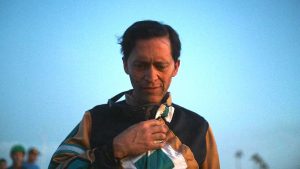Jockey represents something special for Clifton Collins, Jr. The 51-year-old actor got his start with many years of bit parts, including a lot of “numbered” characters early on. He paid his dues, enjoyed something of a breakout in 1997’s One Eight Seven, and then for quite a number of additional years after that became a go-to supporting player in glossy, well-made studio fare (Price of Glory, Tigerland, Traffic, The Last Castle). 2005’s Capote, in which Collins portrayed killer Perry Smith opposite Philip Seymour Hoffman’s titular true crime chronicler, further elevated his profile, and in 2006 he landed an Outstanding Supporting Actor Emmy nomination for his work in the miniseries Thief.

Character-study drama Jockey, though, finds Collins stepping into the Number One spot on the call-sheet, and it represents the unique and powerful beauty that small-scale cinema can still achieve when it matches an actor an audience has had a chance to see grow up before their eyes with a well-crafted lead role which gives them the opportunity to stretch and try something new. In director Clint Bentley’s film, co-written with Greg Kwedar, Collins stars as Jackson Silva, an aging professional horse rider whose best professional years are perhaps behind him. When trainer Ruth Wilkes (Molly Parker) pairs him with a special horse, however, there seems to be the chance for one last lap of glory. Around this same time, a young man named Gabriel (Moisés Arias) shows up, claiming to be Jackson’s son. As he grapples with injuries and regrets, Jackson must figure out what he wants the rest of his life to look like.
There’s an elegiac, somewhat hypnotic beauty to Jockey, gorgeously lensed by cinematographer Adolpho Veloso. And at the center of it all is Collins, who delivers grounded, superlative work that wonderfully evidences all he has absorbed and learned throughout the decades of his career. At its core this is a fairly simple story, but it is engagingly told with a restrained confidence that neither shortchanges nor phonily inflates its heart-plucking elements. Jockey comes to Blu-ray presented in a quite solid 1080p transfer with excellent resolution and consistent colors, in 2.39:1 widescreen, with English DTS-HD 5.1 master audio and Dolby digital 5.1 audio tracks, alongside optional subtitles in English, English SDH, Spanish, and French. The disc’s bonus features consist of a trio of deleted scenes, running six minutes in total, as well as the movie’s trailer.
Chilean filmmaker Pablo Larrain burst onto the scene, for many American film fans, with 2016’s Jackie, starring Natalie Portman — no matter the fact that he’d been directing films to great acclaim in his homeland for a full decade. Ema, his 2019 follow-up, focuses on a pair of artistic free spirits in an experimental dance troupe, company director Gastón (Gael Garcia Bernal) and the titular dancer (Mariana Di Girolamo) who is also his ex-wife. The pair’s lives are thrown into disarray when their adopted son Polo (Cristian Felipe Suarez) is involved in a shocking incident. As their relationship further implodes in the wake of their decision to abandon him, Ema embarks on a journey of liberation and self-discovery.
Powerfully acted, and told in the same somewhat elliptical, poetic strokes as much of Larrain’s recent work, Ema represents the middle chapter of his informal trilogy of women trying to make their way through a thicket of trauma and pain, as bookended by the aforementioned Jackie and of course last year’s Spencer, starring Kristen Stewart. Cinematographer Sergio Armstrong, composer Nicolás Jaar, and editor Sebastián Sepúlveda are all superb “same-page” collaborators, executing Larrain’s gauzy vision here. The film’s Blu-ray presentation from Music Box Films consists of a 1080p high-definition transfer and a Spanish language 7.1 DTS-HD master audio track, presented in 2.39:1 widescreen. Alongside a photo gallery and green- and red-band trailers for the movie is a select-scene audio commentary track by choreographer José Vidal, plus a collector’s booklet which features an interview with Larrain and a thoughtful essay on the movie.
The sophomore feature film from acclaimed music video director Rich Ragsdale, The Long Night serves up a healthy buffet of genre tropes for undemanding audiences who can appreciate style over substance. The story centers on New York transplant Grace (Scott Taylor-Compton), an orphan who heads south searching for the parents she’s never known, with her well-to-do boyfriend Jack (Nolan Gerard Funk) in tow. The area triggers some trace memories of her past, but the couple’s getaway trip takes a bizarre and terrifying turn when a dead cat turns up on their porch and then members of a demonic backwoods cult start terrorizing them. More troubling? This is no mere accidental stalking, it turns out, as the group’s twisted apocalyptic prophecy hinges on some dark secrets linked to Grace’s past.
Leaning heavily, as one might expect, on atmosphere and mood, The Long Night slips the noose of judgement a bit as a calling card for the below-the-line craftspeople involved in the film. But while its script, by Mark Young and Robert Sheppe, has a couple structural tricks up its sleeve, it struggles a lot more in crafting compelling characters and dialogue. The jump-scare stuff wears thin as well, leaving one ultimately feeling that the film’s title is an accurate description of its viewing. The movie’s Blu-ray presentation from Well Go USA Entertainment is at least a quite nice one, though: hearty bonus features consist of a feature-length audio commentary track from Ragsdale in which he balances anecdotes about production with some decent DIY advice for would-be filmmakers; three separate behind-the-scenes featurettes; and Ragsdale’s award-winning short film The Loop.
Another horror effort with (in its own head, at least) a bit more on its mind arrives in the form of Stoker Hills, which takes a ripped-from-the-headlines conceit (the human transplantation of a pig heart) and grafts it onto a low-budget slasher flick in somewhat slapdash fashion, with a pinch of mismanaged self-awareness. Director Benjamin Louis isn’t assisted much by a cast who trade in no small amount of signposted emoting, but neither does he particularly acquit himself well on a technical level.

Written by Jonah Kuehner, the movie centers on a bunch of film school students, which is the first of a couple teeth-clenching red flags for Stoker Hills. As the group sits and listens to pontifications from their professor (Tony Todd), they poke and prod and film one another, but there are so many cheats in this handheld footage, it’s terrible. Once the movie gets away from this film-within-a-film conceit, and ostensibly showing us footage of what the cops have found (more on this in a moment), it becomes more tolerable — at least on a purely filmic level. If cinematographer John Orphan struggles with action and framing, he at least comes up with some nicely lit frames that make use of a blue/yellow color palette — somewhat unusual for a horror film.
Those characters, though? Smarmy would-be director Jacob (Vince Hill-Bedford) and his friend Ryan (David Gridley) have an idea for Streetwalkers, a Pretty Woman-meets-The-Walking-Dead pitch about zombie prostitutes taking over a small town, and they enlist the assistance of actress Erica (Steffani Brass). When she gets snatched off the streets at night, the pair scramble to try to rescue her, leading them into the lair of a masked serial killer. In parallel, a pair of police officers, Detectives Adams (Eric Etebari) and Stafford (William Lee Scott), try to track down all of the aforementioned teens, and figure out exactly what the hell is going on in their town. After the cops chase down a lead on some missing medical equipment, the appearance of Dr. Jonathan Brooks (John Beasley) hints at something a bit more labyrinthine and squirrelly, so it’s a disappointment when one realizes he’s only there to basically give background information on a pig heart transplant, and air-quote set up the killer’s unhinged motivations.
The dialogue and investigative musing in Stoker Hills is sometimes risible (“Well, he must be mad at God or something,” opines one detective), but one can appreciate, in a certain way, the meandering and noodling afforded some of its supporting characters. This writing ultimately feels designed to do little more than introduce some red herrings, but these characters and sequences actually end up being the most memorable thing about Stoker Hills — much more engaging than these dumb kids. The film’s ending, meanwhile, manages to both eschew subtlety (hello, shotgun blasts) and also serve up a “twist” which, in trying to cleverly reframe the whole movie, actually just comes across as sigh-inducing and self-negating. Stoker Hills comes to Blu-ray presented in 16×9 full-frame, with 5.1 surround sound and 2.0 stereo audio tracks, plus optional English SDH, housed under a motion-menu main screen. Apart from the obligatory 12 chapter selections, there are no supplemental features.
For those who grew up on pulpy mystery novels, Miss Willoughby and the Haunted Bookshop scratches a certain itch. Starring Nathalie Cox and Kelsey Grammer, this family-friendly movie centers on the title character, a university professor, orphaned at a young age, with an insatiable appetite for investigation. When she’s asked by some old family friends to look into some hauntings at their antique bookstore, she begins to wonder if someone isn’t playing a trick on the weary proprietor. Movies like this live and die on their plotting, and if the film’s staging leaves a good bit to be desired, screenwriters Kate Wood, Chad Law, and Josh Ridgway skillfully play enough cards to keep things decently engaging — abetted in large measure by some nice chemistry from Cox and Grammer. Miss Willoughby comes to DVD with a complementary cardboard slipcover case, in 1.85:1 widescreen with an English language 5.1 Dolby audio track and optional Spanish, English SDH, and French subtitles. Bonus features consist of the chapter stops, the movie’s trailer, and a brief behind-the-scenes featurette which includes cast and crew interviews.
